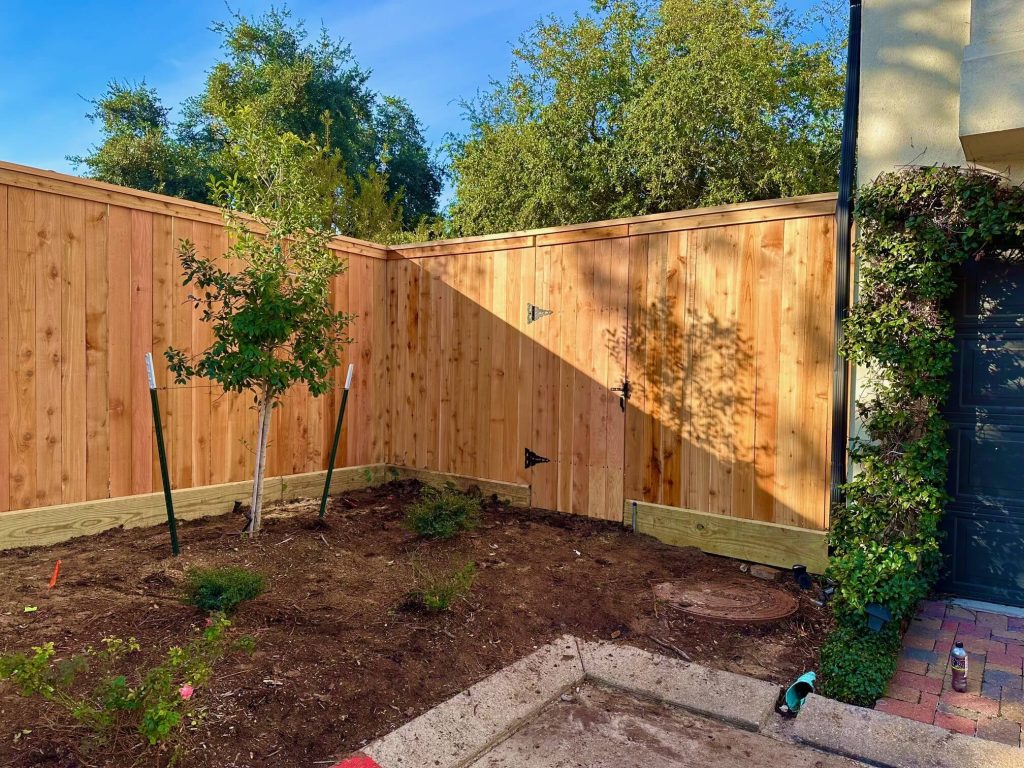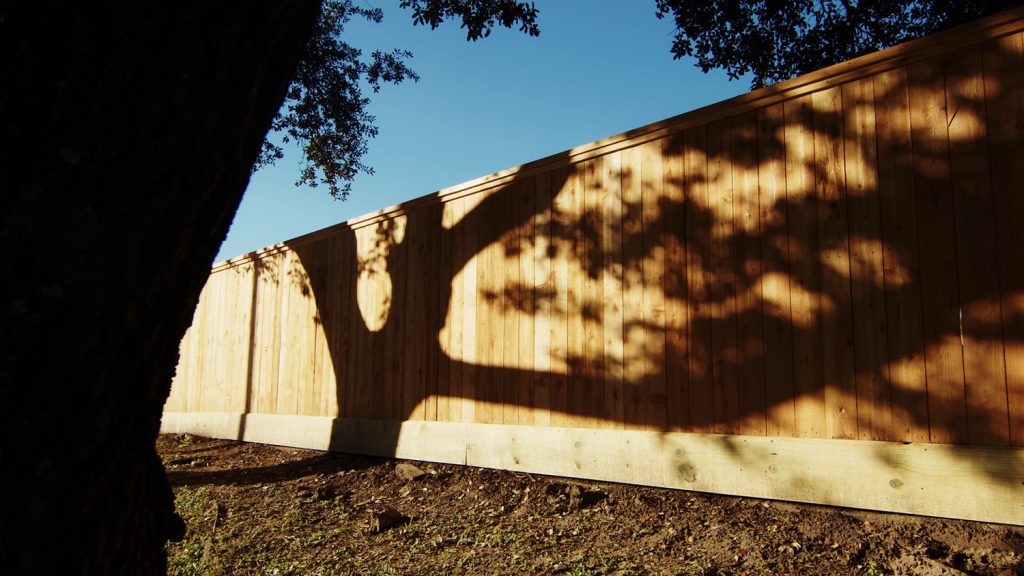How to Choose the Right Fence for Your Conroe Backyard
Selecting the right fence for a Conroe backyard involves traversing multiple considerations. Homeowners must evaluate durability against Southeast Texas humidity, maintenance requirements, aesthetic appeal, and budget constraints. Wood offers traditional charm but demands regular upkeep. Iron provides security with elegant styling but at premium costs. Vinyl delivers weather resistance with minimal maintenance. Each material presents distinct advantages in Conroe’s challenging climate. The ideal choice ultimately depends on specific property needs and long-term expectations.

Key Points On Choosing The Right Fence
- Consider Conroe’s humid climate when selecting fence materials, as it accelerates wood rot and metal corrosion without proper maintenance.
- Cedar and pressure-treated pine resist moisture better than standard pine, while wrought iron requires rust prevention in humid conditions.
- Vinyl fencing offers superior longevity with minimal maintenance, resisting humidity-related warping common in Conroe.
- Calculate lifetime costs including installation, materials, and maintenance—wood is cheaper upfront but requires more maintenance over time.
- October to March is ideal for the right fence installation in Conroe to avoid heat stress and seasonal rain damage.
Understanding Conroe’s Climate Challenges for Fencing
Humidity, relentless summer heat, and seasonal downpours define Conroe’s climate profile, presenting unique challenges for fence installation and longevity.
Conroe’s unforgiving climate trilogy demands thoughtful fencing strategies to ensure lasting protection and value.
These Southeast Texas conditions accelerate wood rot, metal corrosion, and material degradation without proper selection and maintenance.
Local homeowners should consider pressure-treated woods or cedar, which resist moisture better than standard pine varieties.
Galvanized or powder-coated iron offers superior durability against Conroe’s notorious humidity.
Vinyl fencing, while initially more expensive, provides substantial climate resistance without the maintenance burdens of traditional materials.
Installation timing matters considerably in this region, scheduling between October and March avoids both summer heat stress on materials and the spring rain patterns that can compromise proper post setting.
Proper drainage solutions around fence lines are essential investments for protecting your boundary investment against Montgomery County’s frequent weather fluctuations.
Wood Fences: Natural Beauty With Proper Maintenance
Wood fencing remains the quintessential choice for Conroe homeowners seeking traditional aesthetics with material versatility. Cedar and pressure-treated pine dominate the local market, with cedar offering natural resistance to Southeast Texas humidity and insects. Local species adapt particularly well to Montgomery County’s soil conditions. Weather-resistant fasteners like galvanized and stainless-steel nails are recommended for wooden fence construction in Conroe’s humid climate.
To combat Conroe’s moisture challenges, homeowners should apply water-resistant sealant annually and schedule quarterly inspections for early detection of warping or decay—common issues during summer monsoon season. Strategic installation of concrete footers prevents ground contact deterioration, extending fence lifespan by 5-7 years.
Most Conroe neighborhoods embrace wooden privacy designs at 6-8 feet height, providing both security and curb appeal. With proper maintenance, quality wood fencing delivers 15-20 years of service while maintaining the natural character cherished throughout East Texas communities.
Wrought Iron: Elegant Security for Generations
While often confused with aluminum alternatives, true wrought iron fencing represents the premium choice for Conroe estates seeking both ornamental appeal and unmatched durability.
These handcrafted installations withstand Montgomery County’s humidity and summer storms while maintaining their structural integrity for decades.
Wrought iron’s versatility accommodates both historic and contemporary architectural styles throughout East Texas.
Local homeowners appreciate the customizable scrollwork and finials that reflect their personal aesthetic while providing robust security.
The 2-3 inch gaps between pickets guarantee visibility while preventing intrusion.
Though requiring periodic rust inspection and repainting every 3-5 years, properly maintained iron fencing often outlasts neighboring properties’ enclosures.
Many Conroe families consider this investment worthwhile, as these fences frequently become cherished property features passed between generations.
Iron fences can last up to 40 years with proper maintenance, providing a timeless and secure addition to any property.
Vinyl Fencing: The Low-Maintenance Alternative
For homeowners seeking security without the maintenance demands of wrought iron, vinyl fencing offers a compelling solution throughout Montgomery County.
This durable synthetic material resists Texas’s harsh climate conditions, never requiring painting, staining, or treatment for termites.
Vinyl stands strong against Texas weather while eliminating the maintenance burdens of traditional fencing materials.
Modern vinyl products mimic traditional wooden styles—including privacy panels, pickets, and ranch rails—while delivering superior longevity.
Most manufacturers offer transferable lifetime warranties, making vinyl particularly cost-effective over time.
In Conroe’s humid climate, vinyl’s resistance to moisture-related warping and splitting proves invaluable.
Installation typically involves setting prefabricated panels between posts, making it quicker than traditional wood construction.
Local suppliers offer UV-protected formulations specifically engineered for Southeast Texas’s intense sunlight, preventing the fading common in lesser-quality vinyl products.

Cost Comparison: Initial Investment vs. Long-Term Value
While wooden fences typically offer the lowest initial investment, their maintenance costs over a 15-20 year period often exceed the upfront expense of more durable materials.
Homeowners should calculate the total lifecycle costs, including installation, materials, maintenance, and potential replacement, rather than focusing solely on purchase price.
Vinyl and metal fencing systems command premium pricing initially but deliver superior value through decades of minimal maintenance requirements and enhanced property value contribution.
Vinyl fencing offers a high return on investment by providing lasting protection and aesthetic appeal with its durability and low maintenance needs.
Privacy Considerations for Your Backyard Sanctuary
Privacy requirements should guide the right fence height selection, with standard 6-foot panels providing adequate seclusion while 8-foot options maximize coverage against elevated nearby properties or two-story neighboring homes.
Strategic placement of lattice toppers or natural plantings can enhance screening in vulnerable areas without creating an imposing barrier.
Well-designed privacy fencing transforms outdoor areas into secluded retreats, allowing homeowners to enjoy their yards without concern for prying eyes or ambient neighborhood activity. Combination of materials for privacy fencing offers a unique look that enhances property aesthetics and value.
The Right Fence Height and Coverage Options
Creating a true backyard sanctuary often hinges on selecting the appropriate height and coverage options for your fence.
Conroe homeowners typically balance privacy needs with aesthetic considerations when determining their ideal fence specifications.
- Standard privacy fences range from 6-8 feet tall, providing ideal seclusion while conforming to most Conroe HOA regulations and Montgomery County codes
- Semi-private designs incorporate partial visibility through lattice tops or spaced pickets, allowing airflow while maintaining security in Texas’s variable climate
- Coverage density varies by material—solid wood panels offer complete screening, vinyl provides consistent coverage, while wrought iron requires strategic landscaping for privacy
For corner lots or properties with multiple sightlines, consider varying heights along different sections to maximize privacy where needed while preserving openness in gathering areas.
Personal Space Protection
Safeguarding personal space transforms ordinary backyards into private retreats where Conroe residents can escape neighboring views and unwanted noise.
Privacy fencing options vary substantially in their screening capabilities, with solid wood panels offering maximum seclusion compared to semi-private alternatives like board-on-board designs.
For properties backing to busy streets or commercial areas, consider eight-foot fence heights where permitted by local HOA regulations.
Montgomery County’s subtropical climate makes vine-covered trellises atop standard fences an effective privacy enhancement, with jasmine and crossvine thriving locally.
In established neighborhoods like The Woodlands or River Plantation, staggered fence panels create depth while maintaining privacy.
Strategic placement of evergreen East Texas natives like wax myrtles or American hollies alongside fencing provides year-round supplemental screening, especially beneficial for properties with elevation differences.
HOA and Neighborhood Compatibility Factors
Before selecting any fence design, homeowners should thoroughly review their Homeowners Association (HOA) regulations and neighborhood guidelines.
Many Conroe communities have specific restrictions regarding fence height, materials, and aesthetic requirements that must be followed to avoid costly violations and removal orders.
- Documentation Review – Obtain written HOA covenants and carefully examine sections pertaining to fence installation, setback requirements, and approval processes before purchasing materials.
- Neighborhood Harmony – Select designs that complement existing fences in the vicinity, as cohesive aesthetics maintain property values throughout the subdivision.
- Pre-Installation Approval – Submit detailed plans including material specifications, height dimensions, and property survey to HOA board for formal approval, which typically requires 14-30 days for processing in Montgomery County developments. Compliance with HOA guidelines is essential, including restrictions on materials, colors, heights, and styles.
Professional Installation vs. DIY: What You Need to Know
The decision between hiring professional fence contractors and undertaking a DIY installation represents a significant crossroads for Conroe homeowners planning the right fence project.
Professional installers bring specialized equipment, regional expertise regarding soil conditions, and knowledge of local permitting requirements that many homeowners lack.
Customers praise the quality of fence installations completed by professional contractors in Conroe.
DIY fence installation in Montgomery County requires substantial time investment, proper tools, and understanding of property boundaries.
While cost savings appeal to many, novice mistakes often negate these benefits through material waste and structural issues.
Conroe’s clay-heavy soil and seasonal weather patterns create unique installation challenges that professionals routinely navigate.
For complex materials like wrought iron or for properties with significant grade changes, the right fence installation typically delivers superior longevity and aesthetic results that maintain neighborhood standards.
Takeaway
Conroe homeowners must weigh multiple factors when selecting the right fence solutions. Climate resilience, HOA compliance, and long-term ROI deserve careful consideration. While wood offers traditional aesthetics with regular maintenance requirements, wrought iron provides security with timeless appeal. Vinyl presents humidity-resistant performance with minimal upkeep. Professional installation guarantees proper post-setting and concrete footings, critical for withstanding Gulf Coast weather patterns and maximizing fence longevity regardless of material selection.








